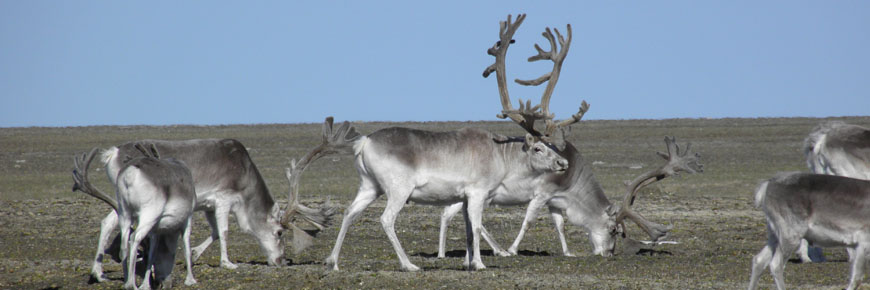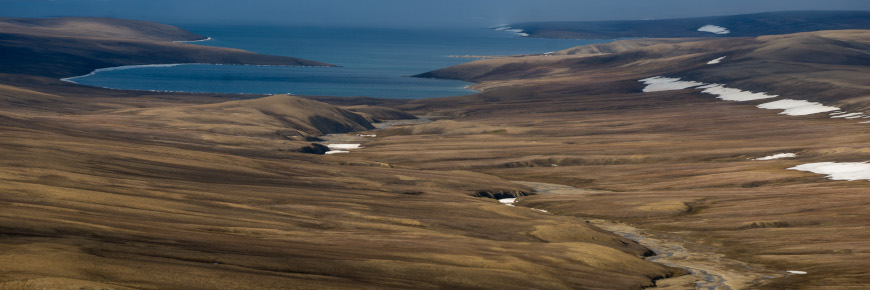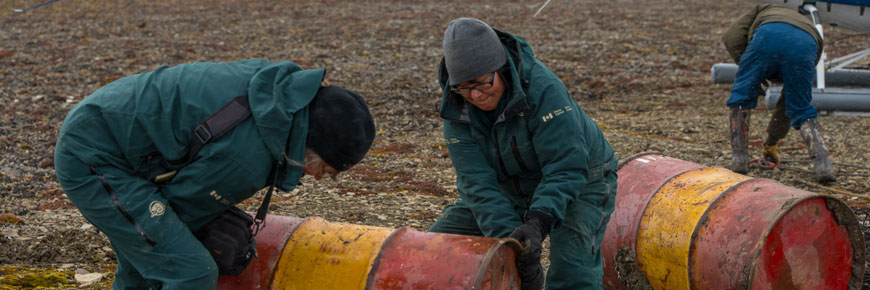
Peary caribou (photo: Morgan Anderson, government of Nunavut)
Tidy tundra = healthy herd
Removing industrial waste in Qausuittuq National Park will restore habitat for the endangered Peary caribou.
For a good part of the year, Qausuittuq National Park is a world without dawn or sunset. Here the sun stays below the horizon for several months in winter. (Qausuittuq—pronounced “Kow-soo-ee-took”—means “place where the sun doesn't rise” in Inuktitut).
But in the summer, the landscape is correspondingly flooded with seemingly endless sunlight.
Covering much of the northern half of Bathurst Island, as well as a number of smaller nearby islands, Qausuittuq is one of the Arctic’s most austerely beautiful areas. The landscape seems to have been distilled down to its essentials—ice, sky, rock and brilliant wildflowers such as the yellow Arctic poppy.
Bathurst Island is part of the range of the iconic Peary caribou, a vital source of food, clothing, and tools for local Inuit. A key reason for creating the park was to protect the caribou habitat found on the island.

The population of Peary caribou, found mainly in the Arctic Archipelago islands of Nunavut and the NWT, was once over 50,000 strong in the 1960s. But it went into a steep decline in the mid-1990s and is still recovering overall.
In the 1970’s and 1980’s, Bathurst Island and the surrounding area experienced a significant amount of oil and gas exploration, which has left a legacy of industrial waste.
The waste includes metal debris such as empty fuel drums as well as concrete and wood waste. Some of the waste is a source of heavy metals and other contaminants.
During negotiations to establish the park, local Inuit raised concerns about the waste and how it was affecting wildlife, including Peary caribou. Parks Canada shared these concerns and committed to cleaning up the waste.
Qausuittuq: protecting a way of life
Qausuittuq National Park is cooperatively managed by Parks Canada and Inuit through the Qausuittuq Park Management Committee. This committee consists of community members from nearby Resolute Bay, appointed by the Qikiqtani Inuit Association and by the Government of Canada.
Parks Canada works closely with the committee and residents of Resolute Bay to develop visitor experiences for one of Canada’s newest parks, while protecting it. As such, visitation to the park is limited while these experiences are still being developed.
As part of the Inuit Impact and Benefits Agreement negotiated with the community, traditional harvesting rights are guaranteed. The park also provides employment and economic opportunities for local people.
Removing scars from the land
Crown-Indigenous Relations and Northern Affairs Canada (CIRNAC), through the Federal Contaminated Sites Action Plan (FCSAP), is responsible for removing the hazardous waste associated with these oil and gas exploration camps in Qausuittuq. Parks Canada is responsible for removing non-hazardous waste, which is not covered by the FCSAP.
The first step was to remove empty fuel barrels. It was no easy task given the unpredictable weather of the region. To make matters worse, a reconnaissance mission revealed that many supposedly empty barrels did in fact contain waste. Parks Canada was able to rely on the community’s help and expertise to locate the drums and remove them.
Parks Canada staff brought in a helicopter to collect empty barrels from five registered contaminated sites and two non-registered sites within the park. The barrels were then deposited at locations accessible to a Twin Otter plane, which brought the containers to Resolute Bay.
Altogether, the team removed 194 barrels over two summers, exceeding their target by four.

Working in collaboration with CIRNAC (for the 2019 work), the team has also begun removing the remaining non-hazardous waste—a multi-year venture that includes an abandoned trailer camp that staff members discovered on their own.
All this is good news for Peary caribou, a species at risk. The smallest of Canada’s caribou, it is already facing threats from climate change, including more severe weather events. The clean-up of the barrels makes the sites more useable for the animals and reduces their risk of exposure to contaminants.
And it removes a scar from this land of raw beauty.
“It was great to help lead such a positive initiative within the park that so many residents of Resolute Bay had been calling for prior to Qausuittuq’s establishment in 2015,” says Angela Piercey, park manager trainee for Qausuittuq National Park.
“The work done through Tidy Tundra = Healthy Herd will help remove any human obstructions along Peary caribou migration paths within the park, and in turn contribute to the survival of caribou relied upon by local Inuit.”
- Date modified :